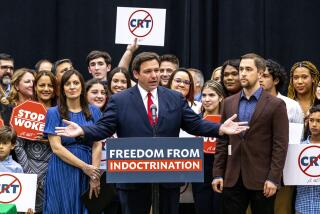Prisoner 9,653 : HARP SONG FOR A RADICAL; The Life and Times of Eugene Victor Debs By Marguerite Young; Alfred A. Knopf: 656 pp., $35
- Share via
As the millennium approaches, one might ask what is the value of a new examination of the life and career of Eugene Victor Debs, a man born midway through the last century who died just past the quarter mark of this one. In his time, Debs avidly supported labor unions, but in our time labor’s presence has dwindled considerably. Debs was also a member of the Socialist Party of America, yet the experience of the last decade in the industrialized world has treated harshly any expectations for a socialist or communist future. We are at the beginning of our presidential political season; Debs was a failed presidential candidate (on five occasions, no less) on the Socialist ticket between 1900 and 1920. What value, indeed, one might ask.
But the gap between Debs’ political concerns and our contemporary experience is not as great as it might seem. Debs was vitally concerned with preserving the power of American citizenship, both to legitimize dissent against injustice in the tradition of the American Revolution and as a celebratory yet meaningful bond that might unite citizens as equals. During a public life of more than 40 years, he asked, time and again, what might be the fate of American democracy in an era of concentrated corporate power and vast differences in wealth among citizens. These issues are as recent as today’s newspaper articles. Discussions about the continued decline of many forms of public and political participation, concern over the fragility of the remaining civic ties that might elevate us beyond our individual interests and the evidence of continued economic difficulty for many even in an era of unprecedented growth suggest as much. What allows Debs’ political vision to remain relevant even in our time is that he drew his inspiration and his fundamental analysis of America’s promise and problems from deep within its democratic tradition.
Debs was not “destined” to become America’s premier dissident but rather came to that through a sustained and honest engagement with the problems of his America. Born in Terre Haute, Ind., in 1855 to immigrant Alsatian parents, Debs grew into his teenage years in a small town that still possessed the prospect of open social mobility. The son of a retail grocer, Debs finished the first year of high school before working as a paint scraper and then a fireman shoveling coal on the railroad run by the city’s largest employer. Laid off in 1874 in the middle of a severe national depression, Debs traveled the Midwest in search of work only to return to Terre Haute and to assume a position as a clerk with his father’s wholesale supplier. But the allure of the railroad had touched the young man, and when an organizer for the Brotherhood of Locomotive Firemen arrived in town in 1876, the erstwhile clerk attended the meeting and found himself elected secretary of the local.
The brotherhood was more of a fraternal organization than a trade union. It did not believe in collective bargaining and it categorically rejected the strike as a tactic to achieve its goals. Rather, the brotherhood preached hard work and sobriety and urged all to discover the “harmony of interests” that was thought to govern economic relations in a democracy. Debs had his first chance to embrace these values when he publicly condemned brotherhood members who participated in the first national railroad strike in 1877. That speech catapulted him into national office in the brotherhood and, as editor of the organization’s Brotherhood of Locomotive Firemen’s magazine, provided him with a platform from which to promulgate these ideas. Those same values won him election as Terre Haute’s city clerk and a few years later as the district’s state representative. So effective was this young Democratic Party politician in winning votes from working people and the business community alike that even the local Republican paper deemed him “the blue-eyed boy of destiny” and foresaw for Debs a future as a congressman if not a U.S. senator.
*
But even as he advocated these ideas, his incessant travels, organizing workers in numerous industries, forced him to reconsider his past understandings. He was if anything a more committed democrat and believed deeply in the power of a common citizenship to structure a society of equals. Yet, as he observed the previously unimaginable concentration of power and wealth among the nation’s industrialists and contrasted it with the sharply limited power and influence of working people, Debs began to articulate a fundamental critique of American capitalism for its unparalleled transformation of American life. It was not working people and their strikes who threatened American democracy, Debs now insisted; rather, it was the industrialists themselves whose cavalier if not brutal use of power threatened the nation’s deepest values and traditions.
Debs welcomed industrial society with its potential for alleviating human suffering, but he raised the essential question that required public debate: How, in a democratic society, can we assure an equitable distribution of the benefits of economic growth? As he said in a famous speech before about 100,000 supporters following his release from jail for his leadership of the epochal 1894 Pullman strike, the Constitution is rent with “the judicial dagger holes made for the accommodation of millionaires and corporations, through which they drive their four-in-hands as if they were Cumberland gaps.”
This was the Eugene Debs who went on to become America’s most appealing home-grown socialist dissenter. Anything but an orthodox socialist, Debs, with his mixture of socialist theory, Christian perfectionism and democratic values, nonetheless brought to American public discussion an important dissenting vision. How would American democratic culture thrive if the premises of society’s economic life remained isolated from its professed democratic principles? It was this Debs, reflecting some of the deepest currents in American life, who announced his position as a socialist in 1897 and who became, in the words of the late Irving Howe, a “tribune of the people.” It was this Debs, the socialist presidential candidate offering an expanded vision of democracy, who received about 6% of the popular vote in 1912 and who, as Prisoner 9,653 in Atlanta Federal Penitentiary for his opposition to American entry into World War I, received nearly a million votes in the 1920 presidential election.
Unfortunately, it is also this Debs who is nowhere to be found in Marguerite Young’s new biographical study, “Harp Song for a Radical.” Simply put, the book is a weakly structured narrative, an olio of ill-connected and ill-conceived images that neither tell the reader the details of Debs’ life nor help interpret the larger public meaning of his career.
Why is this book so unrewarding? Young was a novelist and a poet whose 1965 novel, “Miss MacIntosh, My Darling,” was the best-received of her four previous books. When she turned to Debs, however, she assumed two specific new tasks as a writer. This novelist and poet accepted the biographer’s particular charge to explore the subject’s life in all its historical complexity. Given Debs’ involvements, this would require careful attention to national political issues. Regrettably, Young, who died in 1995 at age 87, did not reflect seriously on the importance of each of these tasks. Thus, she failed as both biographer and analyst. As a result, Young’s book becomes a descent into the maudlin, with the unfortunate result that readers may well confuse the quality of her effort with the relative importance of Debs’ life itself.
To complicate matters further, “Harp Song for a Radical” is not a biography. Young presents nothing of Debs’ life after age 39 and is terribly selective on what she includes before that point. The book is an indulgent meditation on the author’s ill-defined, almost unintelligible utopian dream. As she stated in an interview before her death: “I believe that all my work explores the human desire or obsession for utopia. . . . [It] is about the recognition that there is no single reality. But the beauty of it is that you nevertheless go on, walking toward utopia, which may not exist, on a bridge which might end before you reach the other side.” This muddled perspective may be the only explanation for the otherwise incomprehensible absence of any sustained political analysis in what purports to be a biography of one of America’s preeminent dissenting political figures. At the most fundamental level, the author’s approach prevents readers from understanding Debs’ evolution (even just to age 39), that journey from a conservative trade unionist deeply entrenched in Democratic Party politics into a bold strike leader calling for an alternative to the two mainstream political parties. But even Young’s utopian yearnings are ill-served by this book.
In the 20-odd years that Young spent on this book, American society underwent dramatic change. The economy expanded and new technologies transformed many jobs. But in the process, well-paying jobs with benefits declined sharply for working people, unionization rates dropped precipitously and the gap between wealthy and even middle-class Americans grew exponentially. Debs could not speak directly to these issues, of course. But the reason Debs has remained a vital part of America’s historical memory is because the qualities he brought to public discussions of surprisingly similar issues nearly a century ago. Debs’ socialism always owed less to Marx than it did to an indigenous American tradition that extolled the democratic promise of the American people. Deeply grounded in this American political culture, Debs’ particular genius lay in his ability to encourage individuals in the modern era to find strength in collective organization to better preserve liberty even as he called for the transformation of a corporate business world that circumscribed the individual’s potential for social and economic advancement.
At the core of his vision, Debs asserted the power of the concept of citizenship as the fundamental protector of American equality, justice and democratic liberty. He spoke to revitalize these values in the political arena even as he insisted that their true worth could not be grasped until their influence infused economic decision-making as well. These ideas are indeed important to our time as we ponder the power of our remaining civic bonds that might allow us to transcend the limits of our individualistic, at times atomistic, society. Debs’ answers will not be ours, but a more careful presentation of his life can help Americans today retouch the force of our common values and collective promise.
More to Read
Get the L.A. Times Politics newsletter
Deeply reported insights into legislation, politics and policy from Sacramento, Washington and beyond. In your inbox twice per week.
You may occasionally receive promotional content from the Los Angeles Times.







